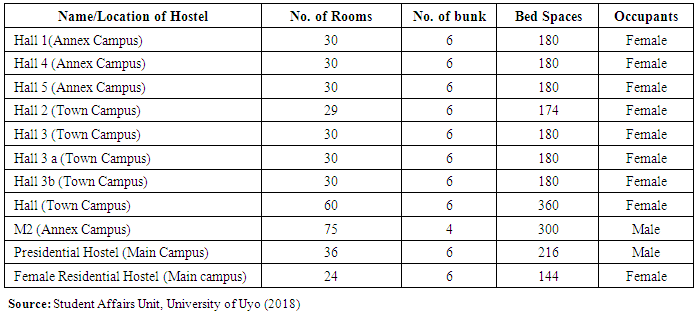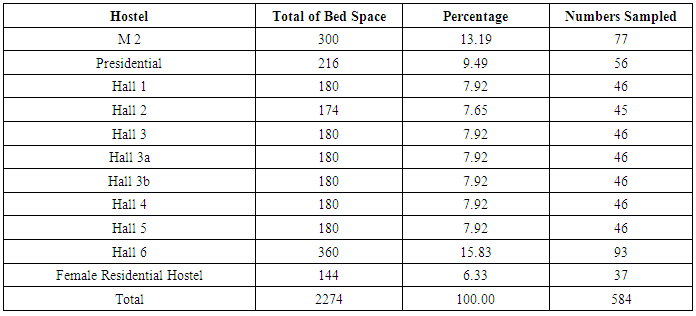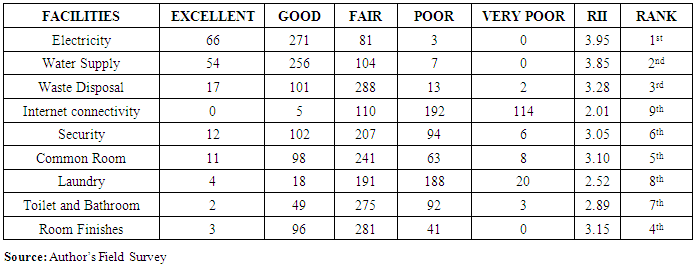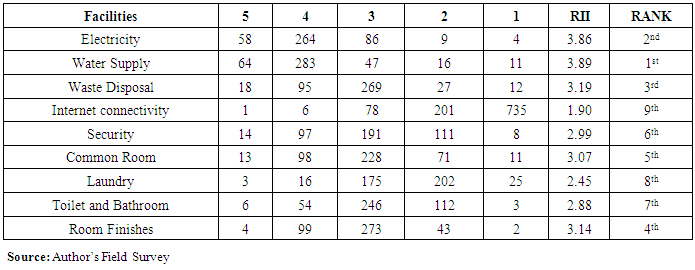-
Paper Information
- Paper Submission
-
Journal Information
- About This Journal
- Editorial Board
- Current Issue
- Archive
- Author Guidelines
- Contact Us
American Journal of Economics
p-ISSN: 2166-4951 e-ISSN: 2166-496X
2019; 9(4): 157-163
doi:10.5923/j.economics.20190904.01

A Study on Students' Satisfaction with Hostel Facilities in Public Universities: The Case of University of Uyo Hostels, Nigeria
Okey Francis Nwanekezie1, Ethel Asinya Mendie2
1Department of Estate Management, University of Uyo, Akwa Ibom State, Nigeria
2Department of Estate Management, Cross River University of Technology, Calabar, Cross River State, Nigeria
Correspondence to: Okey Francis Nwanekezie, Department of Estate Management, University of Uyo, Akwa Ibom State, Nigeria.
| Email: |  |
Copyright © 2019 The Author(s). Published by Scientific & Academic Publishing.
This work is licensed under the Creative Commons Attribution International License (CC BY).
http://creativecommons.org/licenses/by/4.0/

This study examined the condition of hostel facilities and satisfaction level of the students with these facilities at the University of Uyo, Akwa Ibom State, Nigeria. A total of 584 students living in the hostel were surveyed through the questionnaire, and 421 (72.09%) of the questionnaires were returned for analysis. Simple percentage and relative importance index were used to analyze the resultant data. It was revealed by the study that most of the students prefer the University hostel to private accommodation because of the expensive nature of the private accommodation and possible distraction from homes and that most of the students have stayed in the hostel for just one or two years. The work further revealed that most of the facilities in the hostel were reasonably maintained and that the students were averagely satisfied with these facilities. The study among other issues recommended improvement in the area of Internet connectivity, laundry and toilet/bathroom, and construction of more hostels.
Keywords: Hostel, Facilities, Student, Condition, Satisfaction
Cite this paper: Okey Francis Nwanekezie, Ethel Asinya Mendie, A Study on Students' Satisfaction with Hostel Facilities in Public Universities: The Case of University of Uyo Hostels, Nigeria, American Journal of Economics, Vol. 9 No. 4, 2019, pp. 157-163. doi: 10.5923/j.economics.20190904.01.
Article Outline
1. Introduction
- Student hostel has been variously referred to as university housing, student dormitory, catered halls of residence, halls of residence and student housing (Kolawole and Boluwatife, 2016). Suki and Chowdhury (2015) see hostel as a place where people can stay when their residence is located far from the educational institution and which is considered essential to students' needs and also called student housing. For Appiah (2016), it is the provision of a cheap form of accommodation for travelers especially young travelers and students. Iftikhar and Ajmal (2015) define hostel as a place where students stay for pursuing formal education away from their homes, and the concept is not only limited to the place of residence, it is a practical human laboratory, a center of education. Adebisi, Oletubo, Alade and Aghogho (2017) defined hostel from the viewpoint of support facility, when they defined it as not a direct action element in the learning environment of the education sector, but a support facility used to increase instructional effectiveness, improve the cleanness, orderliness, and safety, and increase the efficiency and effectiveness of the students in the learning environment. Though the above definitions present divergent views ranging from cheap accommodation to pursue education and support facility, they all give credence to the opinion that it is a place where students are accommodated for education pursuit.Work by Iftikhar and Ajmal (2015) revealed that hostel life expands the social circle of the hostel students and that during the hostel stay, students learn to live with different types of individuals and increases the students’ level of patience. Abdullahi, Yusof, and Gwamna (2017) have found that hostel impact on the students' performance and thus opined that hostel facilities are among the significant factors that determine the achievement of teaching and learning objectives; hence deplorable facilities pose a barrier to the achievement of this set objective. Factors such as the steady and constant flow of water, electricity, safety and security apparatus, the presence of Internet facilities and location are found to influence students satisfaction with the hostel (Appiah) 2016). Kolawole and Boluwatife (2016) reported that firstly, students who lived on campus were more likely to develop a sense of personal accomplishment and other social skills, secondly, students who lived on campus compared to those who lived off campus were more likely to be involved in campus programs and to take part in extracurricular activities and thirdly, achieved a higher level in terms of both grade point averages and score on standardized achievement tests.Within the last two decades, there has been an explosion in student population in Nigeria (Kolawole and Boluwalife, 2016 and Adebisi et al., 2017). This explosion has exerted pressure on the available hostel facilities and most institutions only provide accommodation for first year and final year students. Some of the institutions have increased their accommodation charges in a bid to either reduce the demand or provide improved facilities as claimed by them. In the face of deplorable facilities in the hostel, as noted by Abdullahi, Yusoff, and Gwamna (2017), one tends to question if the student still derived any satisfaction with such accommodation. The question that also begs for an answer is if the management of these hostels would have been better if managed by experts. Studies such as Khozaei, Hassan and Khozaei (2010), Abbasi, Malik, Chadidhry and Imdadullah (2011), Iftikhar and Ajmal (2015), Mansoor and Ali (2015) and Navarez (2017) have examined students’ satisfaction with campus hostel facilities in other countries. Whereas the works of Ajayi, nwosu, and Ajani (2015), Kolawole and Boluwatife (2016), Adebisi et al. (2017) and Abdullahi, Yusoff, and Gwamna (2017) have examined students’ satisfaction with hostel facilities in South-West and Northern Nigeria without corresponding studies in the South-South or South-East. Thus this present study is designed to examine students’ satisfaction with hostel facilities in the University of Uyo, a school in the South-South of Nigeria.
2. Review of Related Literature
- Studies of students’ satisfaction with hostel are well documented in international papers, while the few local pieces of literature are most South-Western. The available literature and their gap are reviewed in chronological order. Abdullahi (2009) in Malaysia studied the level of satisfaction among the Universiti Utara Malaysia Students towards the facilities provided such as the sports facilities, accommodation, and bus transportation. A cross-section of 51 was surveyed through questionnaire and data analyzed with descriptive statistics. The study found that the levels of satisfaction among students were mixed; however, the majority of students were satisfied with the facilities provided by the University. The sample size of 51 is too small for the study findings to be generalized. Also, the study did not state the study population nor the basis of the sample size. In another study conducted in Malaysis, Khozei et al. (2010) examine the factors that predict undergraduate students level of satisfaction with the student hostels of the University Sains Malaysia. The study surveyed a total of 288 students, and the resultant data were analyzed using factor analysis, student t-test and simple percentages. The study found that satisfaction with fees, distance from university facilities, room safety, room size, hostel security, and hostel facilities were the most critical factors which predicted the undergraduate students' satisfaction with their hostel. It was revealed by the study that there was a significant difference in the satisfaction level between inside – campus and outside- campus hostels students. This study did not state the study population, and therefore the sample size cannot be said to be representative of the population. Khozaed, Hassan and Khozaed (2010) in Malaysia investigated undergraduate students' level of satisfaction and sense of attachment to place. A sample of 267 students drawn from Malay, Chinese and Indians students was randomly selected from seven hostels of the University. Pearson Product Moment Correlation and ANOVA were used to analyze the gathered data. It was also revealed that there is a significant positive correlation between the level of satisfaction and a sense of attachment to place. The findings of the study are relevant as it has revealed the sense of attachment to the hostel to be dependent on the level of satisfaction of the student. However, the study failed to state the study population.Abbasi et al. (2011) in Pakistan measure the level of student satisfaction with current services offered by Pakistani universities. A cross section of 401 students of Bahauddin Zakariya University (BZU) was sampled through a questionnaire. Mean was adopted to analyze the resultant data. The study revealed that student was dissatisfied with many care services and facilities like teaching, administrative support, library, laboratories, accommodation, medical, and sports. It further showed the students were only satisfied with transportation, classroom and prayer facilities. This work studied all the services in the university system, therefore, lacking in the in-depth study of any.In Akure, Nigeria, Ajayi, Nwosu, and Ajani (2015) examined students' satisfaction with hostel facilities in Federal University of Technology, Akure. A total of 322 students from a population of 1,923 were surveyed through the questionnaire. The data were analyzed using the relative satisfaction index. The study found that the level of students' satisfaction with hostel facilities such as electricity and water supply was high while that of the toilet, laundry, and firefighting equipment were low. It also revealed that the students were not very satisfied with bathrooms and kitchenette. It concluded that the students were dissatisfied with facilities either because they were inadequate in number or quality or because of the location. The study recommended the need for the provision of more hostels with better designs and current facilities through a public-private partnership to meet the needs of the growing students' population. This study has brought to fore the inadequate state hostel facilities and dissatisfaction level of students with these facilities in South-West, but, similar studies need to be conducted in other parts of the country to have a holistic view of the situation in the country.In a qualitative study, Ifikhar and Ajmal (2015) in Pakistan investigated the impact of hostel life using a sample of 10 hostel student. The authors opined that hostel life expands the social circle of the hostel students because the hostel is a combination of a multicultural social group. The study found that personality characteristics associated with the hostel students such as they are considered to be confident, punctual, social, realistic, compromising, responsible and sharp in many domains of life. It also highlighted that during hostel stay, students learn to live with different types of individuals and hostel life increases the students’ level of patience. This study is not empirical; therefore its findings and conclusive should be interpreted with caution.Mansoor and Ali (2015) in Sri Lankan investigated the impact of hostel students’ satisfaction on their academic performance. Using random sampling method, 367 final year hostel students were surveyed. Data were analyzed using mean, standard deviation and Pearson Product Moment Correlation. The study found that overall average hostel students’ satisfaction was 3.29 with significantly greater P values and the average GPA of the hostel students was 3.054 with significantly greater than the normal pass. It also revealed that there was a significant positive correlation between the students’ GPA and overall satisfaction factors. The study further showed that out of the seven identified factors of satisfaction, five factors of accommodation, food facilities, inmate cooperation, library facilities, and safety or security significantly influence the academic performance of students. The findings of this study are quite relevant as it revealed the impact, satisfaction with hostel facilities, has on academic performance of students, even though its choice of sampling only final year student will limit its generalization.Suki and Chowdhury (2015) in Malaysia examined whether location, facilities, and quality of on-campus hostels affect students' attitude living in on-campus hostels. A cross-section of 230 students living in on-campus hostels in Labuan, Malaysia were surveyed. Multiple regression analysis was adopted to analyze the gathered data. The study found that students’ satisfaction living in hostels was only affected by hostels quality, except for hostels location and hostels facilities. It also showed that students were much concerned that the floor is covered with tile, and the plumbing system is perfect with no water problems which affect their satisfaction living in hostels. The study further revealed that students' attitude is strongly affected by satisfaction. This study did not consider the population size in determining the sampling size.In a Ghanaian study, Appiah (2016) examined the influence of hostel services quality on students’ satisfaction. A cross section of 300 students was randomly sampled. SERQUA model questionnaire was administered to the respondents, and ANOVA was adopted to analyze the resultant data. The study showed that a unit change intangibility would result in 0.054 change in students' satisfaction, whereas a unit change in assurance will bring 0.318 and 0.342 in reliability. It also indicated a unit change in responsiveness would result in 0.096 change in students' satisfaction and a unit change in empathy will bring 0.38 change in satisfaction of the student. This study is on private hostel managed by entrepreneur which is profit driven and present different challenge compared to a public hostel. Notwithstanding, it still revealed significant dissatisfaction of the students. In an empirical study, Kolawole and Boluwatife (2016) examined what influence students choice of residential accommodation in tertiary institutions in Nigeria using the Federal University of Technology, Akure as a case study. A simple random sampling of 470 final year students was conducted through structured questionnaires. Weighted mean score and discriminant function analysis were employed to analyze the gathered data. The study found the proximity to campus, the rental value of property and type of dwelling were the critical factors that influence student choice, while neighborhood attributes do not influence the decision making. The focus of this study is on off-campus hostel facilities, so it will be advantageous to study the on-campus hostel facilities also. More so, the choice of sampling only final year students will limit the generalization of the study findings. Mugambwa, Mugerwa, Mutumba, Muganzi, Namubiru, Waswa and Kayongo (2016) investigated the relationship between privately provided accommodation service quality and customer satisfaction using Nsamizi Trading Institute of Social Development in Uganda as a case study. A cross section of 300 students from 20 private hostels was randomly sampled in the study. The findings of the study established a strong positive significant relationship between security and satisfaction regarding provided accommodation. It also established the hierarchical order of importance from the most critical service quality dimension of reliability, security, and tangibles respectively. The population of the study is unknown; thus the choice or determination of sample size of 300 is without basis thereby introducing a possible bias. Abdullahi, Yusoff, and Gwamna (2017) in an exploratory paper, reviewed physical and non-physical facilities performance in student satisfaction in Northern Nigerian Universities. The authors opined that Nigerian universities are in crisis and characterized by a decline in quality of teaching and learning due to inadequate facilities which led to the unsatisfied performance of staff and students. The paper also evaluated how the performance of physical and non-physical universities facilities affect students' satisfaction with the facilities. The authors concluded that physical facilities performance finds expression within the domain of facilities management and that the result of this process will lead to a better understanding of what the students and more about how the facilities perform. This study was without any survey or case study. Therefore its conclusions can best be described as the author’s opinion. In another study of the Federal University of Technology, Akure, Adebisi, et al. (2017) examined students' perspectives on private hostel facilities in proximity to the University. A cross section of 281 students was surveyed through the questionnaire. Relative importance index and weighted mean score were used to analyze the resultant data. The study showed that internet connectivity and electricity were the most needed facilities in the hostels. The study also found that privacy and length of the lease were the major factors that influenced students' decision to reside in private hostels. It further showed that students were highly satisfied with security, road network, waste disposal system but were dissatisfied with common room, electricity, Internet connectivity, and laundry facilities. Unlike the study of Ajayi, Nwosu, and Ajani (2015) which was on the public hostel facilities, the work of Adebisi et al. (2017) is on the private hostel facilities which should ordinarily complement the earlier research work. It has failed to state the study population from which the sample size of 281 was derived. In Philippine, Navarez (2017) studied how satisfied students were in terms of the six dimensions of the living environment. A sample of 38 respondents was surveyed through a structured questionnaire. The gathered data were analyzed using the weighted mean score. The findings showed the living condition of students do not meet their needs and demands in terms of a learner-centered and quality – driven student housing facility wherein active and collaborative learning is encouraged. The study also revealed that residents' appraisal of their residential environment does not meet the students' needs and expectation. The study has no population study, and the sample size of 38 students is too little to generalize the study findings. Besides, the author wrongly interpreted the analysis technique which led to wrong conclusions.
2.1. Study Area
- The University of Uyo is situated in the Central Business District (CBD) of Uyo metropolis, Akwa Ibom State. It was established in 1991 inheriting the facilities of the former University of Cross River State (UNICross). University of Uyo (UNIUYO) has multi-campus of Town Campus and Annex Campus along Ikpa Road in the CBD of Uyo Metropolis, Main Campus at Use Offot, along Nwaniba Road, a periphery of Uyo metropolis, College of Health Sciences Campus at her Teaching Hospital, and Ime Umanah Campus at Abak, Abak Local Government Area. The University of Uyo has eleven (11) halls of residences (hostels which have 2,274-bed spaces spread across the various campuses. The cost of bed space for both male and female hostel is N8,500.00 (Eight Thousand, Five Hundred Naira Only) per annum ($24). Preference is usually given to first-year students and final year students in the allocation of bed space since the available space is inadequate for the student population. The distribution of bed spaces for both male and female hostels are as shown in table 1 below:
|
2.2. Research Methods
- Students living in hostel accommodation of the University of Uyo in 2017/2018 constituted the study population. Records available at the Students Affairs Division of the University indicated that there are 2,274-bed spaces spread across eleven (11) hostels as shown in table 1. The sample size was determined at 95% confidence level to be 584.272 and approximated to 584 students. To allow for equal opportunity in the sampling, proportionate sampling using the percentage per hostel to determine the number to be sampled in each hostel was done. Table 2 below shows the number of students sampled in each hostel.
|
3. Data Presentation and Discussion
- This section presents data gathered through the administration of a questionnaire on the respondents. First, the researcher sought to know how long each of the respondents has resided in the hostel facility, ad table 3 below present their responses.
|
|
|
|
4. Conclusions and Recommendations
- This study had investigated the condition of available facilities in the hostel of the University of Uyo and the satisfaction level of the students with those facilities. The study concluded that the available facilities are fairly maintained and that students are averagely satisfied with the available facilities. It also concluded that most of the students prefer the hostel due to the high cost of renting private accommodation outside the campus.University management should improve the condition of Internet connectivity within the hostel and school premises. The laundry area and toilet/bathroom should be provided more to reduce the level of deterioration of these facilities. More hostels should be constructed to accommodation levels 200 to 400 to end the current practice of allocating bed spaces only to first-year students and final year student. The male hostel should also be given priority in any new construction of hostel since their bed spaces are only 22% of the total bed spaces in the University.
 Abstract
Abstract Reference
Reference Full-Text PDF
Full-Text PDF Full-text HTML
Full-text HTML




